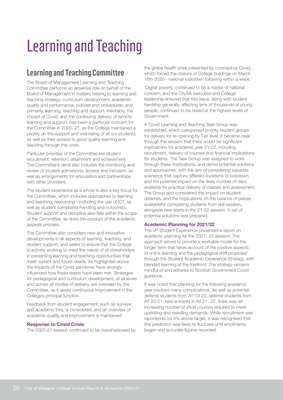
20 City of Glasgow College Annual Report & Accounts 2020-21
Learning and Teaching
Learning and Teaching Committee
The Board of Management Learning and Teaching
Committee performs an essential role on behalf of the
Board of Management in matters relating to learning and
teaching strategy; curriculum development; academic
quality and performance, policies and procedures; and
primarily, learning, teaching and support. Inevitably, the
impact of Covid, and the continuing delivery of remote
learning and support, has been a particular concern for
the Committee in 2020- 21, as the College maintained a
priority on the support and well-being of all our students,
as well as their access to good quality learning and
teaching through this crisis.
Particular priorities of the Committee are student
recruitment, retention, attainment and achievement.
The Committee's remit also includes the monitoring and
review of student admissions, access and inclusion, as
well as arrangements for articulation and partnerships
with other providers.
The student experience as a whole is also a key focus for
the Committee, which includes approaches to learning
and teaching, resourcing - including the use of ICT, as
well as student complaints handling and outcomes.
Student support and discipline also falls within the scope
of the Committee, as does the conduct of the academic
appeals process.
The Committee also considers new and innovative
developments in all aspects of learning, teaching, and
student support, and seeks to ensure that the College
is actively working to meet the needs of all stakeholders
in presenting learning and teaching opportunities that
meet current and future needs. As highlighted above,
the impacts of the Covid pandemic have strongly
influenced how these needs have been met. Strategies
for pedagogical and curriculum development, at all levels
and across all modes of delivery, are overseen by the
Committee, as it seeks continuous improvement in the
College's principal function.
Feedback from student engagement, such as surveys
and academic fora, is considered, and an overview of
academic quality and improvement is maintained.
Response to Covid Crisis
The 2020-21 session continued to be overshadowed by
the global health crisis presented by coronavirus Covid,
which forced the closure of College buildings on March
18th 2020 - national lockdown following within a week.
'Digital poverty' continued to be a matter of national
concern, and the CitySA executive and College
leadership ensured that this issue, along with student
hardship generally, affecting tens of thousands of young
people, continued to be raised at the highest levels of
Government.
A Covid Learning and Teaching Task Group was
established, which categorised priority student groups
for delivery for re-opening by Tier level. It became clear
through the session that there would be significant
implications for academic year 21/22, including
recruitment, delivery of courses and financial implications
for students. The Task Group was assigned to work
through these implications, and derive potential solutions
and approaches, with the aim of considering separate
scenarios that capture different durations of lockdown
and the potential impact on the likely number of days
available for practical delivery of classes and assessment.
The Group also considered the impact on student
deferrals, and the implications on the balance of places
availablefor completing students from last session,
alongside new starts in the 21-22 session. A set of
potential solutions was prepared.
Academic Planning for 2021/22
The VP Student Experience presented a report on
academic planning for the 2021- 22 session. The
approach aimed to provide a workable model for the
longer term that takes account of the positive aspects
of online learning and the pedagogical shift proposed
through the Student Academic Experience Strategy, with
blended learning at the forefront. The strategy remains
mindful of and adheres to Scottish Government Covid
guidance.
It was noted that planning for the following academic
year involved many complications. As well as potential
deferral students from AY 19-20, deferral students from
AY 20-21, new entrants in AY 21- 22, there was an
increasing number of short courses required to meet
upskilling and reskilling demands. While recruitment was
reported to be 4% above target, it was recognised that
this prediction was likely to fluctuate until enrolments
began and accurate figures recorded.